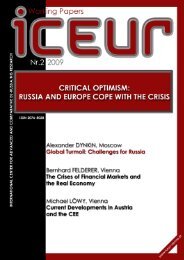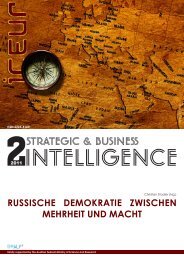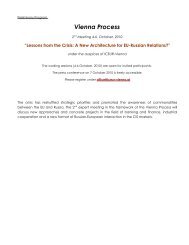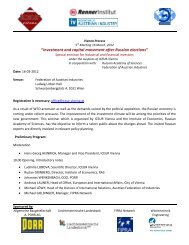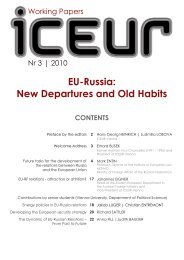International Center for Advanced and Comparative EU-Russia
International Center for Advanced and Comparative EU-Russia
International Center for Advanced and Comparative EU-Russia
You also want an ePaper? Increase the reach of your titles
YUMPU automatically turns print PDFs into web optimized ePapers that Google loves.
etween their own well-being <strong>and</strong> the stability <strong>and</strong> volume of gas <strong>and</strong> oil exports. This fundamental elite interest,which has materialized during the post-Soviet period, implies that <strong>Russia</strong> must avoid a dangerous intensity levelin conflicts with the West, which would render a preservation of the contemporary <strong>for</strong>eign economic relationsimpossible. Nevertheless, the maintenance of living st<strong>and</strong>ards is directly dependent on whether <strong>Russia</strong> willsucceed in preserving its monopoly as an energy transit corridor or not. Precisely <strong>for</strong> this reason, the attempts ofthe <strong>EU</strong> <strong>and</strong> other suppliers <strong>and</strong> transit countries at reaching agreements on new pipelines bypassing <strong>Russia</strong>nterritory are viewed with a jaundiced eye.One of the results of this linkage between the living st<strong>and</strong>ards of the <strong>Russia</strong>n elites <strong>and</strong> Western energy exports isthe intensive tangle with developed industrial countries. High consumption st<strong>and</strong>ards, studies at top educationalinstitutions <strong>for</strong> their offspring, investments in attractive <strong>and</strong> posh real estate, Western bank accounts, shares ofbig US <strong>and</strong> European companies – all this has become part <strong>and</strong> parcel of the life of <strong>Russia</strong>n elites who exhibit noproclivity towards an ascetic lifestyle or self-limitation <strong>for</strong> the sake of national goals. The satisfaction of theseinterests dem<strong>and</strong>s the preservation of a certain stability in relations with the West, since otherwise thesesinterests would be jeopardized. This being said, the <strong>Russia</strong>n happy few regardless of their attempts did notsucceed in integrating themselves into the global <strong>and</strong> particularly the Western elites. They developed a complexof feeling offended <strong>and</strong> limited at the same time.This lead to an even more pronounced fixation on the status of the “lonely state” which walks along its own path.The contradictory character of <strong>for</strong>eign politics is thus caused by the ambiguous attitude <strong>and</strong> position of the<strong>Russia</strong>n elites in the political system. This attitude rests on the attempt at preserving the monopoly over thecountry's resources while positioning themselves as protagonists of national interests on the one h<strong>and</strong> <strong>and</strong> on theeconomic dependency on Western trade on the other. Foreign policy there<strong>for</strong>e oscillates between a hawkish <strong>and</strong>ostensible profile frequently bordering on confrontation <strong>and</strong> periodic cooperative thrusts. To consolidate thesecontradictions, the <strong>Russia</strong>n elites have sought “constructive cooperation” with the West since the beginning ofthe new century.This strategy pursued the realization of a constructive business relationship with the West <strong>and</strong> addresses, in thefirst line, the big <strong>EU</strong> members. The basis <strong>for</strong> this new model relationship was the <strong>for</strong>mula “reliable energy supplyis traded <strong>for</strong> the abstention from intervening into <strong>Russia</strong>n domestic politics”. Incidentally, this new <strong>for</strong>eignpolicy thrust coincided with the final consolidation of domestic authoritarianism between 2003-2004.At this time, the leading circles in Moscow perceived a Western drive to impose another type of relationship on<strong>Russia</strong> which assigned the role of a junior partner to the country. There<strong>for</strong>e, everybody tried to convince US <strong>and</strong>European leaders to find a different <strong>for</strong>mula <strong>for</strong> their official relationship with <strong>Russia</strong>. The most notoriousattempt of this kind was Putin's speech at the international security conference in Munich in February 2007.Accept us as we are <strong>and</strong> do not try to correct our system <strong>and</strong> we will be dependable partners, in the first line,energy suppliers.From the perspective of the <strong>Russia</strong>n elites, such a cooperation should be cast in iron <strong>and</strong> corroborated by the“diffusion” of economic interests. This explains the drive to penetrate into the infrastructure industries – in thefirst line, the gas distribution network – of the European economies without any quid pro quo in exchange. This inits turn is dictated by the insecurity of the <strong>Russia</strong>n elites concerning the strength of their position as internationaleconomic actors. What happens if the West ab<strong>and</strong>ons the present model of cooperation or finds other suppliers?What if the present elites lose their monopoly of disposing of the natural resources <strong>and</strong> their uncontesteddomination in politics? A strong backup against such risks is needed. The ownership of assets in the Europeaninfrastructure can, in this perspective, help to create a hard-wired tangle of interests <strong>and</strong> keep the Europeans fromtaking unilateral steps which could harm the interests of the <strong>Russia</strong>n elites.There is yet another oxymoron of <strong>Russia</strong>n <strong>for</strong>eign policy resulting from the ambiguous position of the leadingelites. The drive to control exclusively the natural resources of the country <strong>and</strong> the corresponding anxietiesregarding the indivisibility of national sovereignty generates a proclivity of the holders of power to engage inunilateral action on the international stage in the field of energy export or security in the post-Soviet space.Simultaneously, the awareness of the unequal power relationship between <strong>Russia</strong> <strong>and</strong> the West <strong>and</strong> the phobiaabout US military <strong>and</strong> political prowess as well as the enlargement of US <strong>and</strong> <strong>EU</strong> presence on the territory of thedefunct Soviet Union prompt a need <strong>for</strong> multilateral action. This is no diplomatic trickery, as is sometimesassumed, but it reflects the long-term interests of <strong>Russia</strong>n elites. It is there<strong>for</strong>e not accidental that the central ideain President Medvedev's proposals on the conclusion of a new agreement on European security was thedeclaration of <strong>Russia</strong>'s readiness to take a multilateral approach in global politics4.4 http://www.newsru.com/finance/26mar2009/zavisimost.html– 7 –




